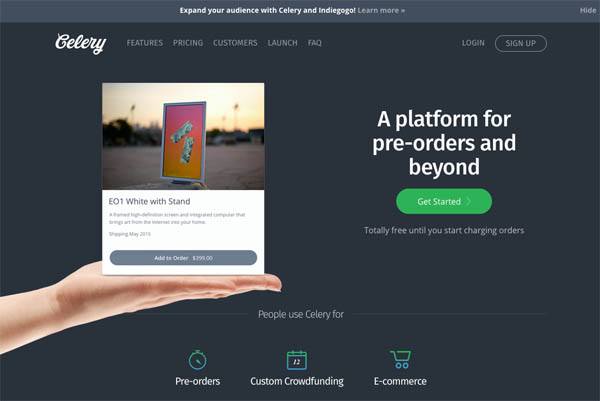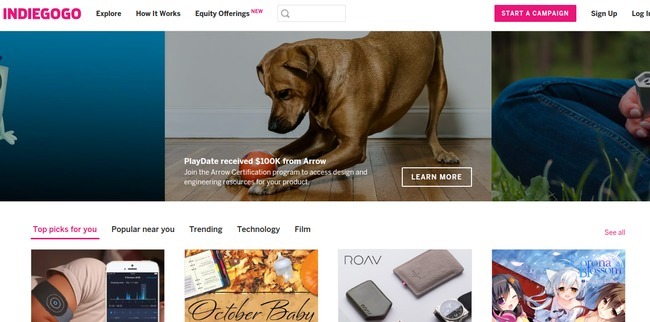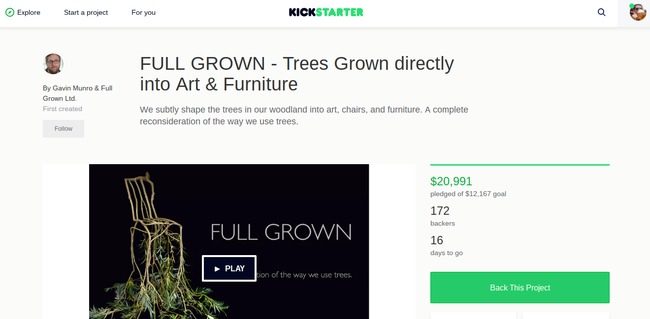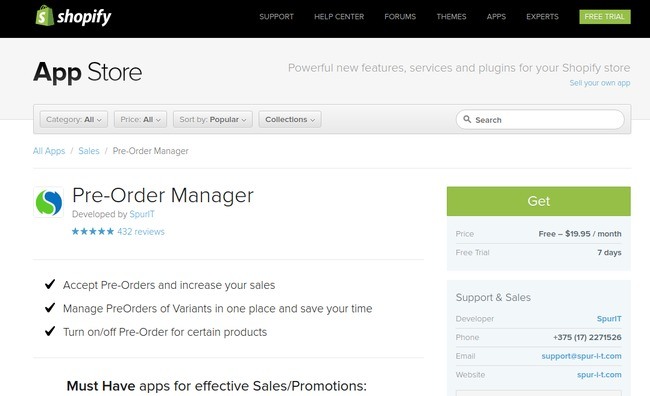Crowdfunding has become extremely popular in the recent past, allowing entrepreneurs and smaller companies to gain funding from regular people for their projects such as movies, smart coolers, interesting games and more. Crowdfunding works by asking people to contribute to the campaigns, who then receive rewards for their “investments.”
It's a wonderful way for inventors, creative people and ecommerce professionals to get money for their new products. But you also have the option to go with a preorder platform such as Celery, which collects money in advance for your initial manufacturing costs. Both preorder and crowdfunding platforms are pretty similar, except crowdfunding systems like Kickstarter require you to reach a certain milestone before receiving any of your money. In contrast, a preorder system puts the money right in your bank account after each person contributes.
Not to mention, preordering generally guarantees the customer a product (since they're buying it,) whereas crowdfunding does not ensure that the donors will see the project come to fruition.
However, since preorder and crowdfunding systems both bring in initial capital, it's useful to compare the best platforms.
Therefore, we're going to take a look at the following options to decide which ones are right for you:
The Interfaces (Setting Up Your Campaign)
Not surprisingly, Kickstarter and Indiegogo are both extremely easy to use.
Celery has wonderful integration options, and configuring crowdfunding and preorder systems is a breeze. However, you have the extra step of integrating with your current website.
Shopify is my least favorite of the pack, since you must include an additional app (and configure everything through a third-party site) like Pre-order Manager or Preorder Me, but because it's so amazingly easy to graduate to a full-blown online shop once you're done with the pre-ordering phase, I want to briefly mention it here.
Is there a clear winner?
Kickstarter and Indiegogo tie for solely crowdfunding tools, but Celery wins for the hosted website solution.
The Fees

- Celery – 2% per transaction + credit card fees.
- Shopify – Credit card fees + fees for whichever preorder app you choose (up to $20 per month)
- Kickstarter – You can expect to pay 5% of your collection when you successfully fund your campaign. The credit card fees are processed through Amazon, and those are generally between 3-5%.
- Indiegogo – You pay 4% of your entire collection, but that's only when you meet your goal. As for credit card processing fees, it has a 3% fee, along with a $25 wire fee if you're running a non-US campaign.
Is there a clear winner?
Celery wins by a long shot, but Indiegogo has the lowest rates for a platform with a community you can market to.
What are the Success Rates?
Here's where it gets a little tricky. When talking about Celery and Shopify, you're typically trying to sell preorders, which don't require you to meet a goal for success. Therefore, the success rate is technically 100% for all of these. You might call it a failure if you only managed to presell five or ten units, but at least you didn't break the bank.
But then again, you're not losing any money if you fail to meet your goal with Kickstarter or Indiegogo either. The main difference is that a preorder system like Shopify or Celery doesn't do much for you in terms of marketing. You'll have to complete the legwork if you want customers to order from you.
However, simply posting your campaign on Indiegogo or Kickstarter means that the millions of folks in that community may eventually stumble upon it (or it might be recommended to them).

Therefore, I feel that if you're looking for a higher success rate, the obvious choice would be a crowdfunding system like Kickstarter or Indiegogo.
But what are the chances that your Kickstarter or Indiegogo campaign will be successful?
As of this article, 118,236 projects have found success with Kickstarter, with 212,298 failing. That's about a 36% success rate. Keep in mind that this is the information Kickstarter has on its own website.
Indiegogo doesn't release its information, but third-party sources state the success rate only comes in at around 10%. Now, the success rates for Kickstarter vary depending on the source you look at, but most all of them state that you have a better chance of funding with Kickstarter.
It's also worth mentioning that Indiegogo has a higher success rate (around 15%) with “fixed funding” campaigns, where a goal must be met to keep the funds. The “flexible funding” scheme is far less successful, and it's probably because some people see it as unethical (basically the company or individual can keep all the money even if they don't reach the goal.)
Is there a clear winner?

Kickstarter gives you a far better chance with success than Indiegogo, but if you're using Celery or Shopify, I'm assuming you already have a following you can rely on.
When Would You Utilize a Preorder Platform Over Crowdfunding?
Crowdfunding takes lots of time and effort to devise a beautiful page with videos, images, copy and all of the other marketing materials that are going to convince users to contribute. All of this takes time and money. Some companies already have a following, they have solid marketing resources, or they already know that customers are going to buy the product.
In this situation, there's no reason to go through the hassle of crowdfunding. The companies and individuals setup the preorder system and the purchases start rolling in. This accumulates initial capital needed for manufacturing and often keeps people on your own ecommerce website.
Which Crowdfunding or Preorder System Should You Go With?
If you're interested in getting the word out about your idea to a huge community of hungry contributors, I would have to go with Kickstarter. Indiegogo has lower fees, but Kickstarter is still king in this arena.
However, if you're trying to avoid those high fees, and you can complete your own marketing for a crowdfunding or preorder campaign, Celery is the obvious choice.
Shopify works well if you already have a Shopify site, but you have to integrate a separate app to make this work right.
If you have any questions about which crowdfunding or preorder platform to choose, let us know in the comments.
featured image courtesy of DKNG





The company is from India and wish to do a Kickstarter campaign what are the procedures through a person or company?
How do I get with customer service for celery
Trycelery is closing down (can still login but no new registrations).
Any new recommendation for 2019? Thanks
We haven’t got the chance to review this service yet, but Patreon might be a great alternative.
Tilt Pro just shut down yesterday. May want to update your post for that fact!
Thanks for the heads up John!
Best,
–
Bogdan – Editor at ecommerce-platforms.com
If this is my first time selling products online, will Celery provide the website domain, landing page design, and scale up capability later on? If not, do I need to change then switch everything to Shopify or Squarespace later?
Hi Helen,
With Celery you can only create and customize a checkout page for pre-orders. It will support all major CMS and website builders so you can embed the code onto your website.
Cheers!
Which one should I pick if I want to launch a comics project?
If it’s your first time I would go with Kickstarter.
Cheers,
–
Bogdan – Editor at ecommerce-platforms.com